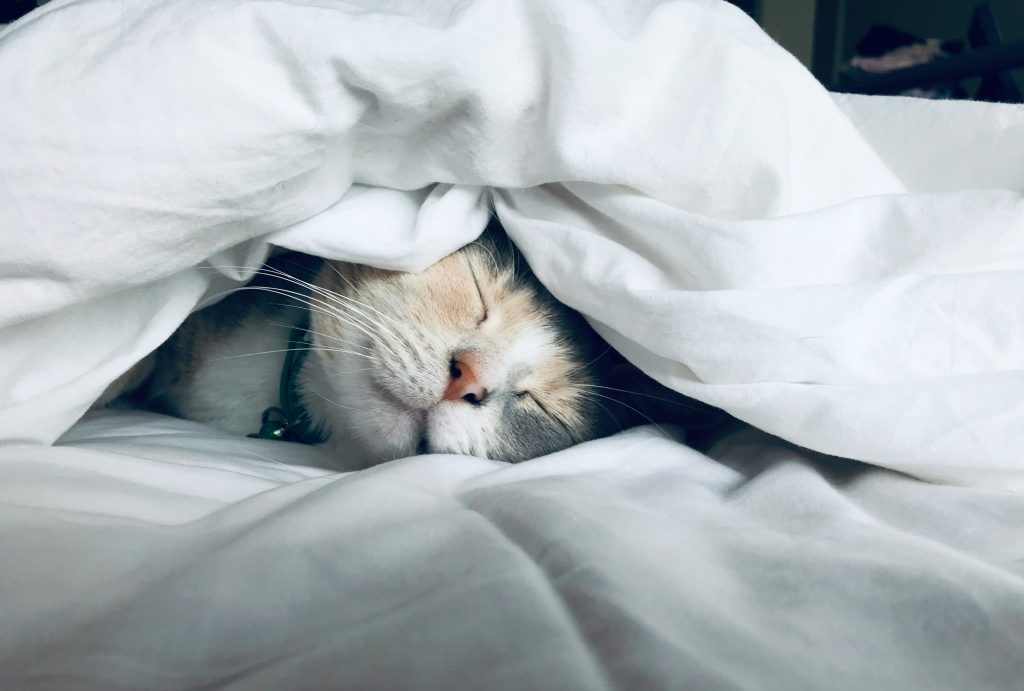
If you having trouble getting a good night’s sleep, you’re not alone. Whether the cause is from a medical condition, stressful situations in life, more and more people are waking up feeling less than rested. Hare some suggestions anyone can try that can lead to a better night’s sleep.
#1 – Exercise Regularly
Some light exercise, such as yoga or walking, can help you when done on a regular basis. This is because 30 to 60 minutes of exercise, when done at least three times a week, can help to relieve any built-up muscle tension.
The best time to exercise is during the morning hours, however early in the afternoon has also been proven effective. The only time you definitely shouldn’t be exercising, is during the two-to-three-hour period of time before you plan to go to bed.
#2 – Don’t Eat or Drink Before Bed
It is recommended that you don’t eat or drink anything during the final two hours you plan to be awake. By consuming less food and drinks before going to bed, you can reduce or even eliminate the number of bathroom visits needed during your sleeping hours.
You should also avoid food and beverages containing caffeine long before it’s time to go to bed.
If you must eat or drink something just before your bedtime, be sure to avoid anything containing grains or sugars as they will raise your blood sugar level and make it harder to fall asleep.
#3 – Before Bed, Enjoy a Hot Bath, or Shower
As the day comes to an end, your body temperature naturally drops. This action tells the brain that it’s time to start feeling tired. By taking a hot bath or shower shortly before going to bed, you can increase this natural drop in temperature and amplify your body’s response.
To be most effective, you should remain in the hot water for around 20 to 30 minutes.
#4 – Use the Bathroom Before Going to Bed
It is recommended that the final thing you do before heading to bed is use the bathroom. In doing so, you reduce the chance of later waking up with the feeling that you need to use the facilities.
#5 – Keep a Consistent Bedtime
For your body to fall into its natural sleep rhythm, the time you go to bed and the time you wake up in the morning needs to remain the same. After a while, your body will begin to recognize when it is time for bed and because of this, it will become easier for you to fall asleep. Your body will also start to recognize when it’s time to wake up, so getting out of bed in the morning shouldn’t be as difficult.
It is vitally important to your sleep rhythm to maintain your consistent sleeping hours during each day of the week. This also includes weekends. To change your sleeping habits mid-week will prevent your sleep rhythm from being properly established and as a result, the quality of your sleep will not improve.
#6 – Limit the Surrounding Noise
All auditory distractions, such as your television and radio, should be turned off during your sleeping hours. The sounds produced by such devices stimulate your brain and make it more difficult for you to initially fall asleep. If the noises from these devices continue to play while you are sleeping, they can also prevent you from entering the deeper stages of sleep later in the night.
Ear plugs are another great resource to lower excess noise while you are sleeping. Since they reduce several decibels of noise, they can be excellent if you are the type of person that prefers to sleep in a quieter environment.
#7 – Darker Rooms Make for Better Sleeping
Maintaining the darkest possible environment is very important during your sleeping hours. Even the smallest bit of light in the sleeping area can inhibit your body’s production of serotonin, which helps to regulate the onset of sleep. If a completely dark room is not possible, you may wish to consider using a sleep mask to block out any additional light.
If you do need to get up in the middle of the night, it’s important not to turn on any bright lights. You should continue to keep the area as dark as possible, because it will be much easier to continue sleeping if your body hasn’t been fooled into thinking it’s time to wake up. A small night light will provide more than enough light to safely find your way in the dark, but it won’t be bright enough to keep you from falling back asleep once you’ve returned to bed.
 by Mike Djordjevich
by Mike Djordjevich
Address :
321 High School Road #303
Bainbridge Island
WA 98110
USA
Telephone : +1 661 645 5572
Email : mike@mdj-cpa.com
Website : http://www.mdj-cpa.com
